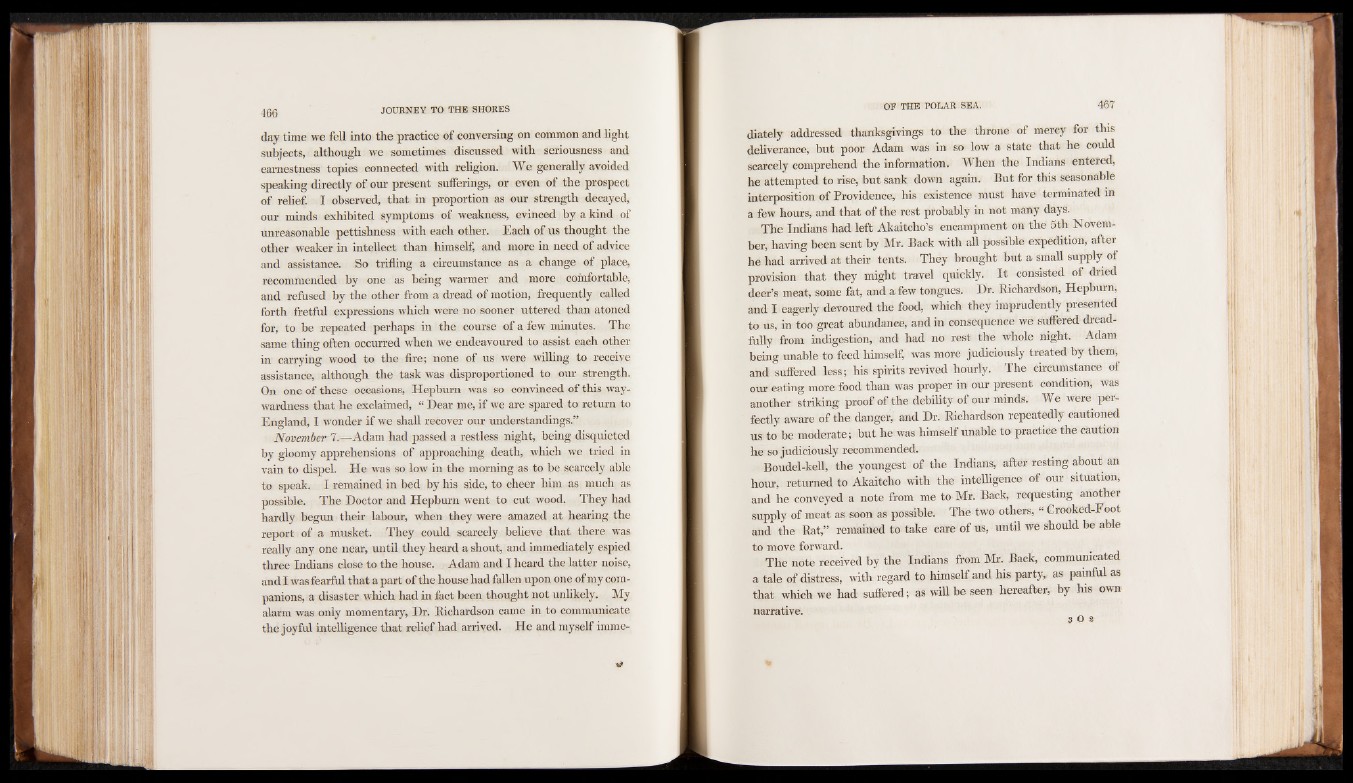
day time we fell into the practice of conversing on common and light
subjects, although we sometimes discussed with seriousness and
earnestness topics connected with religion. We generally avoided
speaking directly of our present sufferings, or even of the prospect
of relief. I observed, that in proportion as our strength decayed,
our minds exhibited symptoms of weakness, evinced by a kind of
unreasonable pettishness with each other. Each of us thought the
other weaker in intellect than himself, and more in need of advice
and assistance. So trifling a circumstance as a change of place,
recommended by one as being warmer and more comfortable,
and refused by the other from a dread of motion, frequently called
forth fretful expressions which were no sooner uttered than atoned
for, to be repeated perhaps in the course of a few minutes. The
same thing often occurred when we endeavoured to assist each other
in carrying wood to the fire; none of us were willing to receive
assistance, although the task was disproportioned to our strength.
On one of these occasions, Hepburn was so convinced of this waywardness
that he exclaimed, “ Dear me, if we are spared to return to
England, I wonder if we shall recover our understandings.”
November 7.—Adam had passed a restless night, being disquieted
by gloomy apprehensions of approaching death, which we tried in
vain to dispel. He was so low in the morning as to be scarcely able
to speak. I remained in bed by his side, to cheer him as much as
possible. The Doctor and Hepburn went to cut wood. They had
hardly begun their labour, when they were amazed at hearing the
report of a musket. They could scarcely believe that there was
really any one near, until they heard a shout, and immediately espied
three Indians close to the house. Adam and I heard the latter noise,
and I was fearful that a part of the house had fallen upon one of my companions,
a disaster which had in fact been thought not unlikely. My
alarm was only momentary, Dr. Richardson came in to communicate
the joyful intelligence that relief had arrived. He and myself immediately
addressed thanksgivings to the throne of mercy for this
deliverance, but poor Adam was in so low a state that he could
scarcely comprehend the information. When the Indians entered,
he attempted to rise, but sank down again. But for this seasonable
interposition of Providence, his existence must have terminated in
a few hours, and that of the rest probably in not many days.
The Indians had left Akaitcho’s encampment on the 5th November,
having been sent by Mr. Back with all possible expedition, after
he had arrived at their tents, They brought but a small supply of
provision that they might travel quickly. It consisted of dried
deer’s meat, some fat, and a few tongues. Dr. Richardson, Hepburn,
and I eagerly devoured the food, which they imprudently presented
to us, in too great abundance, and in consequence we suffered dreadfully
from indigestion, and had no rest the whole night. Adam
being unable to feed himself, was more judiciously treated by them,
and suffered less; his spirits revived hourly. The circumstance of
our eating more food than was proper in our present condition, was
another striking proof of the debility of our minds. We were perfectly
aware of the danger, and Dr. Richardson repeatedly cautioned
us to be moderate; but he was himself unable to practice the caution
he so judiciously recommended.
Boudel-kell, the youngest of the Indians, after resting about an
hour, returned to Akaitcho with the intelligence of our situation,
and he conveyed a note from me to Mr. Back, requesting another
supply of meat as soon as possible. The two others, “ Crooked-Foot
and the Rat,” remained to take care of us, until we should be able
to move forward.
The note received by the Indians from Mr. Back, communicated
a tale of distress, with regard to himself and his party,, as painful as
that which we had suffered; as will be seen hereafter, by his own
narrative. 3 o s